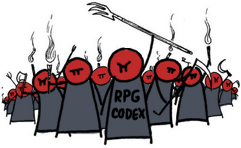I'm basing on the fact that if a publisher was involved they would have the exact same issues that you point out, but with only a fraction of the money and no creative control. Perhaps they woudn't even be able to make the game.
Besides, not only they asked for $100K to make the game, a number that should consider unexpected expenses unless they are retards, and now have 600k, but even if they only manage to sell like 50k copies after launch (VERY modest number, games like Dungeon Defender sold more than 250k) at $10 (same kickstarter price), they would have 500k. Let's say that taxes and middle-mens take insane 300k of them (development expenses are already paid by kickstarter money). They still would have 200k, twice the ammount they initially asked, to make chapter 2. And if the game is actually good, chapter 2 will sell a lot more, not only due positive feedback, but because +12k backers will only get the chapter 1 for their pledge.
Bottom line: Risk always exists in any business, but they had a golden chance that no other industry will ever had: They had nothing, got 6x the money they needed to start their business and with absolutly no strings attached, interest rates or share of profit. So yeah, if they get tight after that, it's absolutly due their fault.
EDIT: And wanting to include a full orchestra on a indie game is exactly the kind of dumb money managedment that may get them "tight", not taxes, middle-man or helping other developers with fucking 5%.
Besides, not only they asked for $100K to make the game, a number that should consider unexpected expenses unless they are retards, and now have 600k, but even if they only manage to sell like 50k copies after launch (VERY modest number, games like Dungeon Defender sold more than 250k) at $10 (same kickstarter price), they would have 500k. Let's say that taxes and middle-mens take insane 300k of them (development expenses are already paid by kickstarter money). They still would have 200k, twice the ammount they initially asked, to make chapter 2. And if the game is actually good, chapter 2 will sell a lot more, not only due positive feedback, but because +12k backers will only get the chapter 1 for their pledge.
Bottom line: Risk always exists in any business, but they had a golden chance that no other industry will ever had: They had nothing, got 6x the money they needed to start their business and with absolutly no strings attached, interest rates or share of profit. So yeah, if they get tight after that, it's absolutly due their fault.
EDIT: And wanting to include a full orchestra on a indie game is exactly the kind of dumb money managedment that may get them "tight", not taxes, middle-man or helping other developers with fucking 5%.







![Glory to Codexia! [2012] Codex 2012](/forums/smiles/campaign_tags/campaign_slushfund2012.png)

























